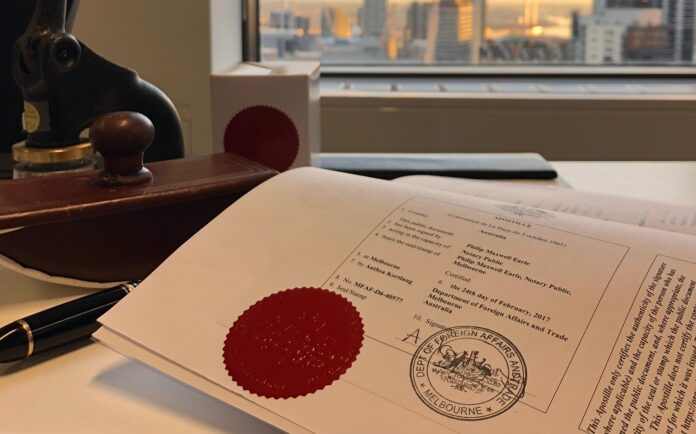There are many misunderstandings regarding the concept of an Apostille. This article aims to clarify what an Apostille is, its role in global transactions, and to dispel common misconceptions.
An Apostille, established under the Hague Convention in 1961, is a form of authentication recognized globally, enabling documents to be accepted in foreign countries.
Its significance lies in its role in international affairs, where it acts as a bridge between countries, simplifying the process of document recognition.
Understanding Apostilles is important for engaging effectively in global transactions. This article will focus on explaining the nature of Apostilles, their process, and their importance in international dealings.
It also aims to debunk common myths, providing readers with a clearer understanding of how Apostilles function and their impact on global document handling.
What Are Apostilles?
An Apostille is essentially an international notarial seal, an official certificate that authenticates the origin of a public document.
In countries participating in the Hague Convention, like Apostille Canada, this certification ensures that a document issued in one country will be recognized as valid in another. This plays a key role in international transactions.
The term originates from the French word for ‘notation’, reflecting its purpose in legalizing documents for international use. Apostilles are used for various public documents, including birth certificates, court orders, and educational records, making them indispensable in global affairs.
The Apostille Process

The process of obtaining an Apostille begins with acquiring an original document from its issuing authority. This document is then taken to a competent authority, usually a designated government office in the country of origin, which verifies its authenticity.
After this verification, an Apostille, typically a stamp or printed form, is attached to the document. The Apostille contains vital details such as the country of origin, the signatory’s name, and the issuing authority, making the document ready for international use.
Misconceptions about Apostilles
#1: All Documents Require Apostilles
A common misconception is that all documents need an Apostille for international use. In reality, the requirement for an Apostille depends on the type of document and the foreign jurisdiction where it will be presented.
Not all documents necessitate an Apostille, with the need largely dependent on the nature of the document and its intended use abroad.
#2: Apostille Seals Verify the Authenticity of a Document
Many people mistakenly believe that an Apostille seal confirms the authenticity of the content within a document.
However, the Apostille’s role is to authenticate the signature and capacity of the person who issued the document, not to verify the content’s truthfulness. An Apostille merely confirms that the document is officially issued, without validating its contents.
#3: Anyone Can Issue an Apostille
It’s often wrongly assumed that any individual or organization can issue an Apostille. The authority to issue an Apostille is strictly with state and federal entities that adhere to the Hague Apostille Convention.
The Convention mandates that each participating country designates specific Competent Authorities to issue Apostilles for documents originating within that country.
#4: Apostilles and Notary Public Seals are Identical
A frequent misunderstanding is equating Apostilles with notary public seals. While they may appear similar, their purposes are distinct. Notary public seals verify the identity of signers and witness the signing of documents.
In contrast, Apostilles certify the authenticity of the signature of a notary or other public official, enabling the document’s recognition in foreign nations party to the Hague Apostille Convention.
The Role of the Hague Apostille Convention

The Hague Apostille Convention, initiated in 1961, was designed to abolish the need for diplomatic or consular legalization of foreign public documents. This Convention led to a standardized method for validating documents internationally, which is now recognized by 117 countries.
The Convention significantly streamlines the process of authenticating documents for international use, making it more straightforward and universally understood among member nations.
The Real Purpose and Function of Apostilles
Apostilles play a key role in the legality and validation of international documents. They simplify the authentication process by eliminating the need for additional certification.
Essentially, an Apostille is a certificate that authenticates the origin of a public document, certifying the authenticity of the document’s signature, the capacity in which the signatory acted, and any stamp or seal on the document.
The Importance of Apostilles in Business Transactions
Apostilles are not just a bureaucratic formality; they play a crucial role in facilitating seamless business transactions across borders. In the realm of international business, the reliance on various documents such as contracts, agreements, and certificates is inevitable.
This section will delve into the specific importance of Apostilles in the context of business dealings, shedding light on how they contribute to the efficiency and reliability of global transactions.
Streamlining International Business Documentation:

In the world of business, time is often of the essence. Obtaining Apostilles ensures that the authentication process for important business documents is expedited.
This expeditious authentication is especially vital when dealing with time-sensitive agreements, mergers, or acquisitions. Understanding the significance of Apostilles in this context empowers businesses to navigate the complexities of cross-border transactions with confidence.
Preventing Legal Hurdles:
One of the primary concerns in international business is the potential legal challenges that may arise. Utilizing Apostilles adds a layer of legal certainty, minimizing the risk of disputes related to the authenticity of documents.
This section will explore how Apostilles acts as a preventive measure, offering businesses a safeguard against legal complications that may otherwise impede the progress of global transactions.
Common Challenges in Obtaining Apostilles
While Apostilles serve as a valuable tool in international transactions, navigating the process of obtaining them can present its own set of challenges.
This section aims to shed light on common hurdles individuals and businesses may encounter when seeking Apostilles. By understanding these challenges, readers can better prepare for the authentication process, ensuring a smoother experience when dealing with international document validation.
Complexity of Documentation Requirements:

Obtaining an Apostille involves adherence to specific documentation requirements, varying from country to country. This complexity can be a stumbling block for individuals and businesses unfamiliar with the intricacies of the process.
This section will outline some of the common challenges related to documentation, offering insights into how individuals can navigate these complexities to ensure a successful Apostille application.
This article has addressed and debunked common misconceptions about Apostilles. Understanding Apostilles’ true nature and function is vital in today’s interconnected world, where international transactions are commonplace.
Apostilles streamlined the legalization of documents for use in other countries, ensuring a smoother process in global affairs. It is hoped that this article has provided valuable insights, making the topic of Apostilles more accessible and less daunting.







